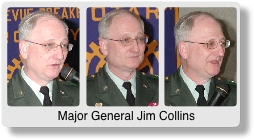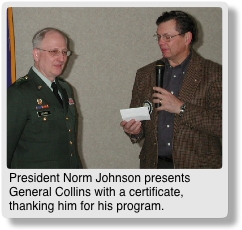|
||||||||||
 |
||||||||||||||||||||||||
|
Vol. 17, No. 33, February 14, 2005 IN THIS ISSUE: This Reveille Home Page | The Friday Program: America’s Army at Fort LewisMajor General James M. “Jim” Collins) | Valentine Dine-Around | Friday Potpourri | Three New Members Proposed: Hendershott, Wood & Kippen | Exchange Student Sol Visits | Hopelink Reports on Grant Funds | Reclassification Talk: Margie Burnett | Web Fun |
||||||||||||||||||||||||
|
||||||||||||||||||||||||
|
The Friday Program: Jim Gordon gave what he called “a real General introduction” when he presented Major General James M. “Jim” Collins to the BBRC audience. The General is Chief of Staff of I Corps and serves as Deputy Commander at Fort Lewis.
After an initial term of service which brought him to the Northwest and Fort Lewis, General Collins worked 22 years for Weyerhaeuser and spent some time in Bellevue. He raised his family in the Tacoma area and he’s back in the active Army now. “We are at war and we are transforming,” said the General. “Most organizations would have difficulty taking on two major initiatives at the same time. World conditions lead the Army to take on both of these initiatives today.” In leading the army into the future, there are two missions for Fort Lewis. First, there’s I Corps, a major Army organization which is on order to deploy in the Pacific Area of Responsibility if the need arises. Second, there’s Fort Lewis, one of the major training bases for the United States Army. Fort Lewis is asked to train and equip all kinds of organizations using a power projection platform for war fighters. “We are also transforming the well-being of our individual soldiers and their families with emphasis on a connection to the community.” Today’s challenges: 1) Lead an active and reserve component integration. 2) Retention of a quality force of soldiers. 3) Management of strategic resources. There are 80,000 acres at Ft. Lewis and 323,000 acres at the Yakima Firing Center under the management of the US Army. 4) Continued environmental stewardship of the acres under control of Fort Lewis. The General also noted that 52% of the earth’s surface is covered by PACOM, the Pacific Area Command with defense treaties encompassing five countries: Japan, South Korea, Thailand, Philippines, and Australia. There are 28,000 soldiers based at Ft. Lewis, with one-half now deployed around the world. Fort Lewis has “outstanding installation facilities and infrastructure and for years has been the favorite and most sought-after U. S. post by our soldiers.” In addition to the active, reserve and National Guard components, ROTC cadets between their Junior and Senior years of college come to the National Advance Leadership camp ... nearly 5000 students in all. “Every Lieutenant who goes into the military through the ROTC program has gone through Fort Lewis.” The post has first rate ranges and training areas. It is the Gateway to the Pacific, with McChord Air Force Base next door. “This gives tremendous strategic, tactical and operational mobility out of Ft. Lewis. The new Strykers 8-wheeled vehicles can be easily flown out of McChord.” With the posting of I Corps at Fort Lewis, the Army displays a wide spectrum of the available forces working in the Army. The Corps is one that is transforming the Army, by having Infantry Brigades, Cavalry, Police, Intelligence, Maneuver Enforcement, Medical, and Support under its control. Also under I Corps is the Cadet Command West of the Mississippi, Special Forces, Ranger, Reserve & Guard training support, CID (Criminal Investigation Division) and the Madigan Army Medical Center.
The Power Projection business is to train, mobilize, deploy and demobilize active and reserve units as their mission proscribes. The global War on Terror created ‘Task Force Olympia’ responsible for 1st Stryker Brigade to go into combat. There’s the 29th Signal Battalion, which in addition to bringing combat signal operations to Iraq is rebuilding a school. “Sadly, there’s not much news coverage from programs of help to Iraqi communities,” said General Collins. The 3rd Brigade has conducted combat operations throughout Iraq. The 555tth Engineers constructed the longest bridge ever built in combat conditions. The Medical Brigade has provided treatment for many civilians as well as our fighting men and women. The 593rd Combat Support Brigade has been another organization in the middle of the fight in Iraq. Back at Fort Lewis, there’s a project called the Family Housing Initiative, which features a long-term lease with a private developer providing 3,801 families living in 13 different areas, new construction. Single family homes and multi-family structures are part of this huge ongoing project. The United States Army has a $1.83 billion annual impact in the Puget Sound region. “We provide emergency response with our helicopters, we host the Washington State Special Olympics, and we give community support in many different ways. Fort Lewis is here to stay,” General Collins observed. In response to a question, the General said that each soldier has the opportunity to purchase life insurance with a $250,000 death benefit. In respect to size of facilities, Fort Lewis is third largest in the States with Fort Hood and Fort Bragg are #1 and #2. Emergency preparedness is one of the important activities of Fort Lewis. The National Guard is the first responder, but the Army teams up with the Federal Emergency Management Administration in case of wide-scale emergencies. We provide support in finding and rescuing lost climbers and have teamed with the U.S. Forest Service and BLM for fighting forest and range fires. A certificate from the BBRC to General Collins was presented noting that 1,220 pounds of fresh food has been donated in his name to area food banks in cooperation with Rotary First Harvest. Thanks to Jim Gordon for his introduction. |
||||||||||||||||||||||||
 |
||||||||||||||||||||||||
 |
||||||||||||||||||||||||
|
CLICK HERE |
||||||||||||||||||||||||
|
Reveille | Reveille Archives | Meeting Information | Calendar | How to Join the BBRC | Officers & Directors | Committees | Online Member Directory | Short Directory PDF File | Directory Info Form | Set Up User Info | Forgot User Info | Meeting Make-Up Form | Attendance Statistics | New Member Application (PDF File) | Expense-Funding Request Form (PDF File) | Rotary Foundation Pledge Form | District 5030 Website & Newsletter | 2004 Raffle Winner | About the Raffle | Email Us DISTRICT 5030 CLUB INFORMATION |
||||||||||||||||||||||||


